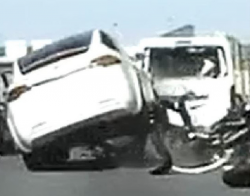
— A Tesla Model X Autopilot lawsuit has been dismissed after Tesla convinced the judge the lawsuit should be filed in Japan.
In April 2018, Yoshihiro Umeda and a group motorcyclists stopped behind a small van on the right side of the Tomei Expressway near Tokyo due to a crash that involved a member of their group.
Mr. Umeda was standing alongside several motorcycles which were parked in an effort to redirect traffic away from the scene of the crash.
Tesla Model X owner Nobuyuki Ito drove his SUV onto the Tomei Expressway and turned on the Autopilot function, driving without incident for about 30 minutes. At one point during this period, the Model X event data recorder detected the driver’s hands on the steering wheel as the driver felt drowsy and started falling asleep.
When the Tesla approached the scene of the earlier crash it struck the motorcycles and Mr. Umeda as he stood on the side of the expressway, killing 44-year-old Yoshihiro Umeda.
The Model X driver, Mr. Ito, was convicted of criminal negligence and sentenced to three years in prison (suspended for five years) in a criminal case held in a Japanese court.
The driver of the Tesla, the victim Mr. Umeda and the plaintiffs in this case, who are Mr. Umeda’s spouse and child, are all Japanese citizens. In addition, the Tesla Model X was sold in Japan.
Tesla Files a Motion to Dismiss the Lawsuit
Tesla filed a motion to dismiss the California lawsuit based on the doctrine of "forum non conveniens" because Japan is a more appropriate location.
“The doctrine of forum non conveniens allows a court to dismiss a case properly before it when litigation would be more convenient in a foreign forum. But dismissal based on forum non conveniens is 'an exceptional tool to be employed sparingly.'”
However, the plaintiffs aren't required to choose the “optimal forum” for their lawsuit.
Judge Susan van Keulen says to prevail on a motion to dismiss based on forum non conveniens, Tesla bears the burden of showing an adequate alternative forum exists and the balance of private and public interest factors favors dismissal.
However, “[b]ecause the central purpose of any forum non conveniens inquiry is to ensure that the trial is convenient, a foreign plaintiff’s choice deserves less deference.”
"Because Plaintiffs are citizens of Japan, their decision to file suit in this District is entitled to less deference than is normally afforded a plaintiff’s choice of forum. But less deference is not the same thing as no deference.” - Judge van Keulen
The judge says she realizes the plaintiffs have legitimate reasons to file suit in California because Tesla is headquartered there and relevant evidence concerning the design of the Tesla Autopilot system is located in California.
"Accordingly, the Court affords some deference to Plaintiffs’ choice of forum despite the fact that Plaintiffs are foreign citizens."
The judge also found that just because a plaintiff cannot file the “exact suit” in Japan that she filed in California, or that “United States law offers Plaintiffs a greater potential remedy for their losses,” this doesn't make the alternative forum inadequate.
In addition, the lack of jury trials in Japan “does not render Japanese courts an inadequate forum.”
"Indeed, the Ninth Circuit has repeatedly found Japan to be an adequate alternative forum, including in cases involving claims for negligence and strict liability. Tesla puts forth that Japanese law provides redress for the injuries and causes of action alleged in Plaintiffs’ complaint." - Judge van Keulen
Tesla argues the case should be heard in Japan because of access to evidence concerning the death of Mr. Umeda. But the plaintiffs argue the lawsuit is primarily a products liability case because the suit concerns the design of the Tesla Autopilot system in California.
The judge says Tesla overstates the evidence that will be available only if the lawsuit proceeds in Japan, but Tesla is correct that certain liability evidence from third parties as well as important evidence concerning the plaintiffs’ damages claim is located in Japan.
Tesla further argues, and the judge agrees, that access to third-party evidence in Japan for a proceeding in the U.S. would be at "best extraordinarily cumbersome, time-consuming, expensive and with uncertain results."
“Japan is not a party to the Hague Convention . . . [T]he third party cannot be compelled to produce such documents or be interviewed or deposed. . . Japanese law also does not allow for Japanese citizens to appear at a deposition telephonically or by remote video for use in U.S. litigation.”
California Lawsuit Dismissed
In dismissing the California lawsuit, the judge says Tesla has a lot of evidence in its control that can be presented in Japan, but there is evidence in Japan that will be unavailable to the automaker if the lawsuit stays in California.
The Tesla Model X Autopilot lawsuit was filed in the U.S. District Court For the Northern District of California, San Jose Division: Tomomi Umeda, et al., v. Tesla, Inc, et, al.
The plaintiffs are represented by the Law Offices of Edward C. Chen, and ZeLo Japan.




